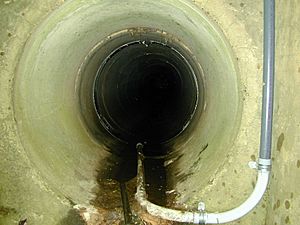Sewer facts for kids
Sewers are like hidden underground pathways, made of pipes, that carry away dirty water and human waste from our homes, schools, and businesses. They play a super important role in keeping our cities and towns clean and healthy. All the water that goes down your drains – from your sink, shower, or toilet – travels through these pipes. This used water, called wastewater, then goes to special places called sewage treatment plants. At these plants, the water is cleaned up before it's safely returned to the environment, like rivers or oceans.
Contents
What Are Sewers and Why Do We Need Them?
Sewers are a vital part of modern cities. Imagine if all the dirty water and waste from every building just stayed where it was – it would be a huge mess and could spread diseases! Sewers solve this problem by collecting all that wastewater and moving it away from where people live and work.
Keeping Our Communities Healthy
Before sewers were common, cities often had serious health problems. Waste would build up in streets or flow into local water sources, leading to outbreaks of diseases like cholera and typhoid. Sewers help prevent these illnesses by safely transporting waste to treatment facilities, keeping our drinking water clean and our surroundings hygienic.
How Do Sewers Work?
Most sewers rely on gravity to move water. Pipes are laid on a slight slope, so the water naturally flows downhill. Think of it like a giant slide for water! However, sometimes the land isn't sloped enough, or the water needs to go uphill. In these cases, special machines called pumping stations are used to push the water along.
What Goes Into the Sewer System?
The water that goes into sewers comes from many places. It includes water from:
- Toilets (flushing waste)
- Sinks (washing hands, dishes)
- Showers and bathtubs
- Washing machines and dishwashers
- Sometimes, rainwater from street gutters is also combined with wastewater in what are called "combined sewers."
Keeping Sewers Clear
Just like any other system, sewers need to be maintained to work properly. Sometimes, things that shouldn't be flushed down the drain, like grease, wet wipes, or even tree roots, can cause blockages.
The Role of Cleaning Crews
Special cleaning crews use powerful trucks and tools to keep the sewers clear. They might use high-pressure water jets to blast away grease or special cutters to remove tree roots that have grown into the pipes. Keeping the sewers free of blockages is important to prevent sewage from backing up into homes or overflowing into the streets.
Sewers in Different Areas
While most cities have extensive sewer systems, some areas, especially more rural ones, might not have them.
Septic Systems for Rural Homes
In places where there are no sewers, homes often use a septic system. A septic system is a private, underground wastewater treatment system. It collects the wastewater from a single home or a few homes in a large tank. Inside the tank, solid waste settles to the bottom, and the liquid waste then flows into a drain field, where it slowly soaks into the ground and is naturally filtered by the soil.
 | Precious Adams |
 | Lauren Anderson |
 | Janet Collins |


